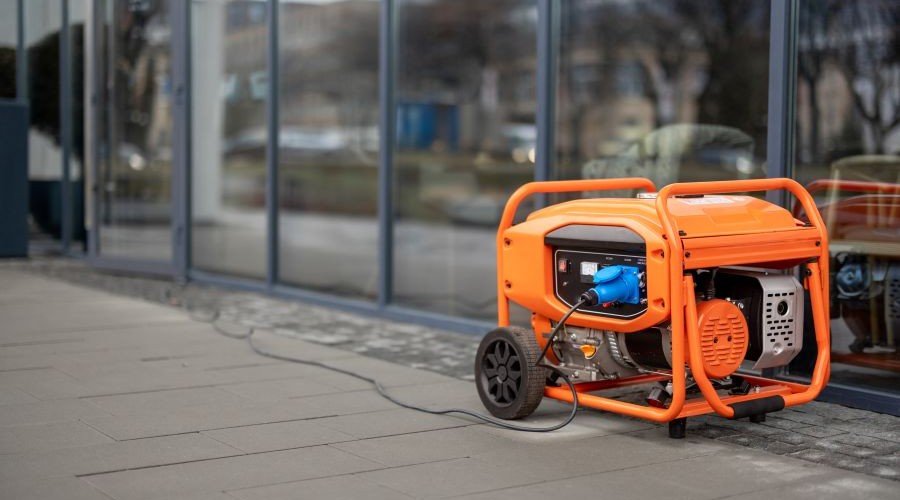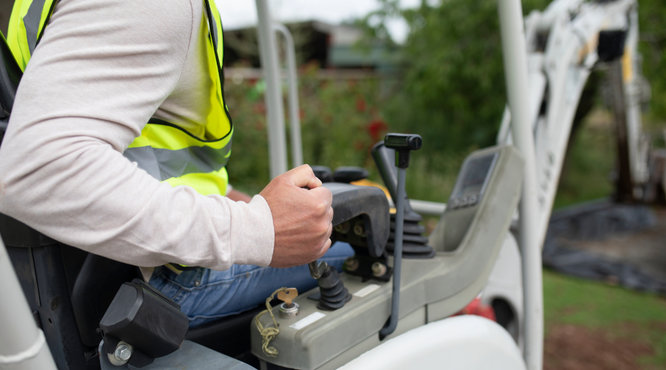When you work in construction, or host events that take place outside, it’s likely that you will be in locations where accessing electrical power from the local grid is difficult. In these cases, having a power generator is essential to ensure safety and comfort.
But what is a generator? When can they be used and how do they work? Below we’re discussing when to use a generator, the different types and why they’re useful.
What is a generator?
A generator is a piece of equipment that converts energy into electricity. Portable and towed generators can be used as a power source in locations that are away from the electricity grid or during power outages, making them idea for outside construction sites or events such as festivals. For temporary use, you can hire generators across the UK.
When can generators be used?
Compact and portable power generators are ideal for powering small tools and machinery on-site when the work zone is remote or isolated, and access to grid power is not possible. Larger road tow and static generators are also suitable for equipment, but they are also powerful enough to run lights, heaters, and welfare units, allowing you to ensure your site is equipped with all the amenities required to provide a healthy and comfortable environment for workers.
How does a generator work?
There are four main types of generators; diesel, petrol, solar, and hybrid. Each work in slightly different ways and can be est used in different applications:
How do diesel generators work?
Diesel generators have been a staple in the construction industry for years. They burn diesel fuel to convert it into electricity. Specifically, they use a combustion process where air is compressed in a cylinder, raising its temperature. Fuel is then injected into this cylinder and is ignited by the high temperatures. This combustion causes expanding gases that push a piston. The piston is connected to a crankshaft, which converts the linear motion of the piston into rotational motion that turns an electromagnetic rotor. This turning motion generates electricity along coiled wires leading to the outputs.
In terms of benefits, diesel units stand out for their fuel efficiency, durability, and high power output. Because diesel fuel has a higher energy density than petrol, it contains more energy per unit of volume. This means the generators require less fuel to produce the same amount of power. This higher fuel efficiency can make them more affordable to run on longer jobs. When it comes to durability, it’s hard to beat diesel engines. These engines are the same as those used in the trucks and boats that move all over the world and face some of the toughest conditions. They are designed to withstand high temperatures and pressures, making them less likely to fail or break down. This can be critical in jobs where consistent power is essential. Diesel engines also emit less CO2 and greenhouse gases than petrol models. Sometimes, heavy-duty work needs heavy-duty power, and diesel engines are well known for their high torque. In the case of a generator, a high-torque engine means that it can handle sudden and large electrical loads exceptionally well.
Application: remote operation
If a project is situated far from urban areas; somewhere more rural, harsh, or isolated, the site’s remoteness could mean the availability of grid electricity is not an option. Diesel fuel is more commonly available in remote areas and has a higher energy density, meaning that there is a reduced frequency of refuelling trips. For a heavy-duty project, the high torque of diesel engines makes them perfect solution for powering machinery and equipment. The durability of these units makes them ideally suited to harsh environmental conditions and rugged terrain.
How do petrol generators work
Petrol generators also convert energy into electricity using combustion. However, petrol units use a spark plug to ignite the fuel instead of highly compressed air. This means they have a lower compression ratio, are quieter, and easier to start. Petrol generators also typically come in smaller sizes, making them more portable. This smaller footprint makes them more suitable for environments with limited space; on some projects, this can be a key advantage. They also offer a lower initial cost, lower noise levels, and easier cold weather starting.
When it comes to maintenance, petrol engines generally have simpler designs with fewer components compared to other types. This simplicity can result in lower maintenance requirements and costs over the equipment's lifespan.
Application: emergency response and disaster recovery
When an area is impacted by a disaster, access to grid power is almost always impossible. Electrical energy is needed to power the emergency response and disaster recovery operations. Petrol generators are ideal as they are smaller and highly portable, making them easy to transport quickly to the locations that need them. They are also easy to start, and they will start quickly.
How do solar powered generators work?
Solar generators utilise the power of the sun, providing a quiet and renewable source of energy that can reliably power your project. The technology behind them is based on the photovoltaic effect, wherein sunlight is converted into electricity. This process involves the use of solar cells, which are made from semiconductor materials such as silicon. When sunlight hits these cells, electrons within the material become excited, and a flow of electricity is created that can be harnessed to power various devices. Most solar powered equipment will feature panels that are mounted onto a frame that is designed to hold them in place and ensure that they are properly aligned to receive the maximum amount of sunlight possible. These panels are connected to an inverter – a piece of technology designed to convert the DC electricity produced by the panels into AC electricity that can be used to power the tools and equipment you use in your day-to-day work.
One of the key advantages of solar power is that it's a renewable energy source, unlike fossil fuels. Solar generators are virtually silent, making them perfect for use in areas where noise pollution is an issue. Because of their unique energy source, they also feature low operating costs. Once one is turned on, there are no ongoing fuel costs associated with it. This means that you can save money on your projects and get consistent electricity even over long periods of time. They also have a long lifespan and are designed to last up to 25 years, and are equipped with all the latest features to ensure that they are a reliable and cost-effective investment.
Application: sustainable construction site in an urban area
If a project aims to minimise environmental impact, adhere to green building standards, and showcase a commitment to renewable energy, a solar generator would be the best option for powering the project. Because of the commitment to minimising environmental impact, using grid energy or traditional fuel is out of the question. However, solar equipment is compliant with green building standards. They also feature zero emissions and comply with all noise pollution requirements, making them ideal for a situation like this.
How do hybrid power generators work?
Hybrid generators are yet another alternative power source for your projects. They use multiple power sources to create a more versatile and efficient system. They typically use a combination of diesel, propane, natural gas, or battery power to provide a reliable and scalable power solution. One of the unique benefits of hybrid technology is their ability to switch between power sources depending on the needs of the job site. For example, if you’re working in an area where diesel is not readily available, you can switch to propane or natural gas without having to hire a new generator. This versatility in power sources makes them an effective choice for contractors working in different locations and environments.
Different jobs have different power requirements, and your requirements may even change over the course of a project. Hybrid generators are highly scalable, coming in a range of sizes, from portable units to large industrial systems, meaning that you can choose a generator that fits your specific needs. They are also highly fuel efficient. By combining multiple power sources, they are able to operate more efficiently than engines that rely solely on diesel or petrol. These generators do use fuel, but also have charging batteries that store power. As soon as there is a power draw, the unit can automatically switch between available power sources so that your project is never interrupted. This means that you can save money on fuel costs over time, while still having a reliable source of power for your job site.
Application: remote installation and maintenance
Consider a scenario where a contractor is tasked with maintaining telecom towers in remote or difficult-to-access locations. The remoteness of the towers makes getting grid power difficult so a generator would be needed. However, the requirement for power would be highly variable as the team went from tower to tower, with only some towers potentially needing maintenance or repair. In this case, a hybrid generator would certainly be an excellent option. Because of a hybrid generator’s adaptability, the team would be able to better manage changing power requirements. Furthermore, a hybrid generator can provide extended runtime, making it easier to use on jobs where frequent refuelling would be impractical. These four scenarios should give you a better idea of the different features each generator possesses and how you might use these generators on your own projects and events. Different generators come with their own benefits and downsides, and these should all be considered before purchasing or hiring a generator.
Top tips for using a power generator
- Power: look at the wattage you need or the type and number of tools and appliances you plan to use. Then, calculate whether the generator you are looking at can handle the load.
- Generator overload: take care not to overload the generator. You can do this if you run too many powerful tools or pieces of equipment at once.
- Fuel supply: ensure that you have enough of the necessary type of fuel to hand, so you can keep your generator running when needed, for as long as you need. You may need a fuel tank to store adequate fuel reserves.
- Location: please note that as some units feature combustion engines, you can only use them outdoors and in well-ventilated spaces. Place your generator on-site in an accessible area, where you can get to it when needed. It also needs to be close enough to the tools and equipment.
- Lighting: ensure there is suitable lighting or that you have a torch to hand so you can operate it in the dark.
- Testing: test your generator at a time when it is not needed, such as before the start of a job or before a power outage. This will allow you to become familiar with how to start and run the unit when needed.
- Electric start charge: some generators have an electric start function rather than a pull cord. If your equipment has an electric start, you must ensure that the start battery is kept charged up.
- Prevent Large Periods of Inactivity: Fire up your equipment occasionally, even when it is not required. This will help to keep the engine running smoothly, like with a car.
Hire a power generator
Every situation is different when it comes to power requirements. It’s important to understand your specific needs to make an informed decision on which equipment to use, whether you need to power tools, lighting towers, heaters, or welfare units. Generator hire is a cost-effective and efficient way to support your project and site.






